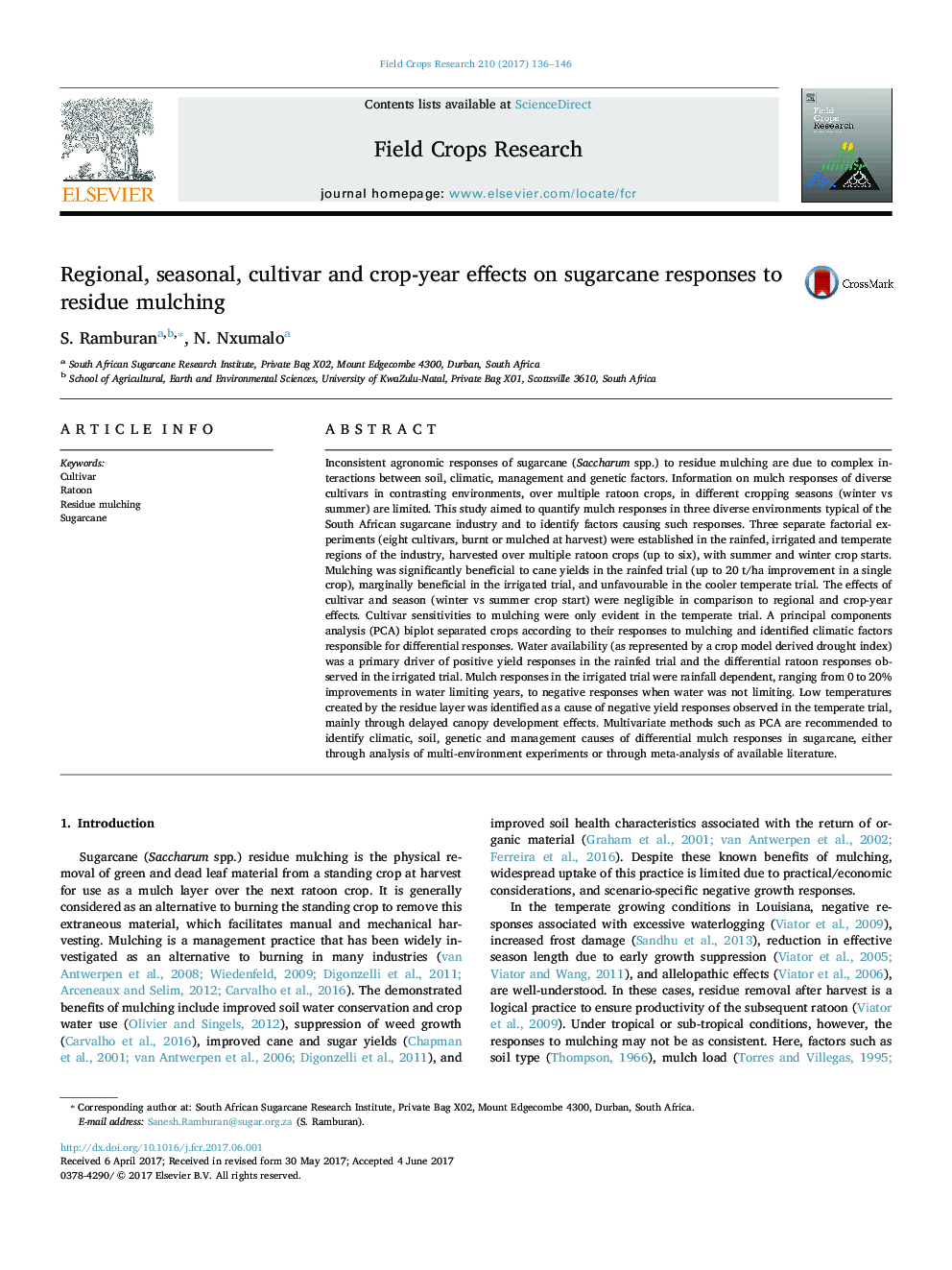| کد مقاله | کد نشریه | سال انتشار | مقاله انگلیسی | نسخه تمام متن |
|---|---|---|---|---|
| 5761442 | 1624653 | 2017 | 11 صفحه PDF | دانلود رایگان |
عنوان انگلیسی مقاله ISI
Regional, seasonal, cultivar and crop-year effects on sugarcane responses to residue mulching
ترجمه فارسی عنوان
اثرات منطقه ای، فصلی، رقم و سال زراعی بر روی پاسخ های نیشکر به موزائیک باقی مانده
دانلود مقاله + سفارش ترجمه
دانلود مقاله ISI انگلیسی
رایگان برای ایرانیان
کلمات کلیدی
ارقام، راتون، مشت زدن باقی مانده، نیشکر،
موضوعات مرتبط
علوم زیستی و بیوفناوری
علوم کشاورزی و بیولوژیک
علوم زراعت و اصلاح نباتات
چکیده انگلیسی
Inconsistent agronomic responses of sugarcane (Saccharum spp.) to residue mulching are due to complex interactions between soil, climatic, management and genetic factors. Information on mulch responses of diverse cultivars in contrasting environments, over multiple ratoon crops, in different cropping seasons (winter vs summer) are limited. This study aimed to quantify mulch responses in three diverse environments typical of the South African sugarcane industry and to identify factors causing such responses. Three separate factorial experiments (eight cultivars, burnt or mulched at harvest) were established in the rainfed, irrigated and temperate regions of the industry, harvested over multiple ratoon crops (up to six), with summer and winter crop starts. Mulching was significantly beneficial to cane yields in the rainfed trial (up to 20Â t/ha improvement in a single crop), marginally beneficial in the irrigated trial, and unfavourable in the cooler temperate trial. The effects of cultivar and season (winter vs summer crop start) were negligible in comparison to regional and crop-year effects. Cultivar sensitivities to mulching were only evident in the temperate trial. A principal components analysis (PCA) biplot separated crops according to their responses to mulching and identified climatic factors responsible for differential responses. Water availability (as represented by a crop model derived drought index) was a primary driver of positive yield responses in the rainfed trial and the differential ratoon responses observed in the irrigated trial. Mulch responses in the irrigated trial were rainfall dependent, ranging from 0 to 20% improvements in water limiting years, to negative responses when water was not limiting. Low temperatures created by the residue layer was identified as a cause of negative yield responses observed in the temperate trial, mainly through delayed canopy development effects. Multivariate methods such as PCA are recommended to identify climatic, soil, genetic and management causes of differential mulch responses in sugarcane, either through analysis of multi-environment experiments or through meta-analysis of available literature.
ناشر
Database: Elsevier - ScienceDirect (ساینس دایرکت)
Journal: Field Crops Research - Volume 210, 15 August 2017, Pages 136-146
Journal: Field Crops Research - Volume 210, 15 August 2017, Pages 136-146
نویسندگان
S. Ramburan, N. Nxumalo,
